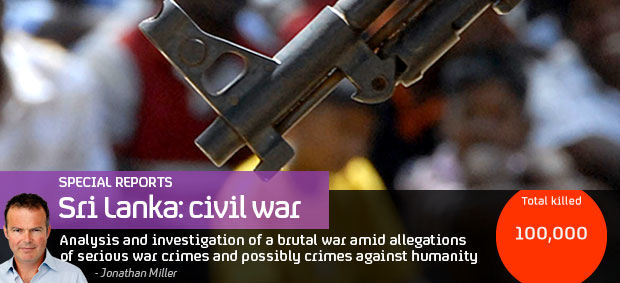Sri Lanka’s Rajapaska wins re-election
Sri Lanka’s President Mahinda Rajapakse is declared the winner of yesterday’s elections although his main rival, General Fonseka, rejected the result.
The general, who spent much of the day holed up inside a hotel surrounded by armed troops, claimed the ballot had been rigged and said the Sri Lankan government wanted to kill him.
State TV declared on Wednesday that Mr Rajapaksa had won the re-election ahead of final results.
An estimated two-thirds of all ballots already officially released from Tuesday’s poll showed Mr Rajapaksa with 4.2 million votes to 2.8 million for former army commander General Sarath Fonseka.
The general said he feared arrest after being surrounded by troops at a luxury hotel in the capital.
The two allies, who laid claim to the defeat of the Liberation Tigers of Tamil Eelam (LTTE) last year, became rivals in a close-fought, bloody campaign that culminated in a relatively peaceful election on Tuesday with a heavy turnout.
Rajapaksa said he wanted to seek a new mandate for his plans to develop Sri Lanka by exploiting its air and sea lanes, rebuilding infrastructure and encouraging foreign investment and local productivity.
International Correspondent Jonathan Miller writes: “Aside from the triumphantist ethnic Sinhalese nationalists who turned out in large numbers to return Mahinda Rajapaksa to power for a second term, Sri Lanka’s Tamil minority now also has reasons to be fearful.
“Many will doubt that, having apparently won a fresh mandate, Rajapaksa will be interested in engaging in serious dialogue with the island’s Tamil minority – 20 per cent of the population – or grant them autonomy.”
Moments before the state TV declaration, two people were killed and four wounded in a grenade attack on a Buddhist temple in the central town of Gampola, military spokesman Brigadier Udaya Nanayakkara said.
It was not immediately clear if the blast was poll-related, he said.
Tension was high early on Wednesday as troops surrounded General Fonseka in the Cinnamon Lakeside hotel in the capital Colombo.
“These people have surrounded the hotel with military and threatened my security people,” Fonseka told Reuters by phone.
“They had a plan to surround us and take us into custody and I don’t know if this is that phase of that particular operation.”
A military spokesman said there were no plans to arrest Fonseka, but rather to capture around 400 army deserters with him who could pose a potential coup risk.
“They have booked 100 rooms. They are highly trained military people. We are suspicious about their gathering. General Fonseka has released nine deserters to the military police,” the spokesman said.
Fonseka quit the army in November and entered the race with the backing of a coalition of political parties united solely to beat Rajapaksa, after he said he was sidelined and suspected of plotting a coup.
The general delivered an election day shock when he admitted that he had not registered to vote, prompting the government to cry foul over an electoral commission ruling that he was still qualified to stand for election.
Independent observers put overall turnout at between 70 and 80 percent of Sri Lanka’s 14 million registered voters, although votes in predominantly Tamil areas registered much lower turnout.
